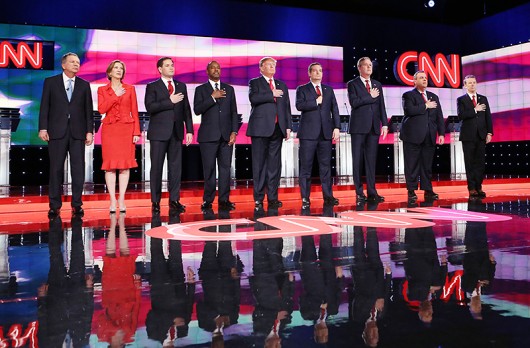
GOP presidential candidates take the stage during the CNN Republican presidential debate in Las Vegas, Nevada on Dec 15. Credit: Courtesy of TNS
From Ted Cruz’s kids to Bill Clinton’s marital infidelities to Barack Obama’s birthplace, are there any issues that aren’t political anymore? Nothing is off limits. Factor in the 24-hour news cycle, national reporters foaming at the mouth for a sensationalizing story, and news outlets catering to only one fraction of the populace, and it seems everything is ripe for being turned into a political controversy. Confrontation has run wild. In August 2014, Congressman Peter King, a Republican from Long Island, New York, expressed outrage and accused President Obama of lacking seriousness when he wore a tan suit during a press conference. The Islamic State was beheading western journalists, but a suit color was the offense.
While American politics has seemingly run amok, especially as one looks toward statehouses or the nation’s capital, I believe regular Americans are not nearly as guilty of such chicanery. Walk down almost any street in America, stop a few people at random, talk to them for a few minutes, and I am willing to bet there are still issues that are apolitical or entirely bipartisan. After much thought, here are two of them.
Issue One: lowering the interest rates on federal loans to college students, thereby decreasing the amount of money student borrowers owe on those loans. With college costs rising exponentially and the job market still iffy, students could use a break. The federal government could make all federal loans to students subsidized, meaning no interest accrues while they are in school, or the federal government could charge a flat fee when the loan is distributed rather than charge any interest on the loan. Yes, this would lessen the profits the federal government receives from issuing student loans, but should the federal government even be making money off students anyway? There is something to be said when the federal government profits from some of the most economically vulnerable in society.
The federal government does not administer the federal student loans program exclusively out of the goodness in its heart — it is a cash cow for federal coffers. There is little incentive for the federal government to encourage schools to increase efficiently, thereby decreasing costs, or to encourage students to take out fewer loans, when those loans are so profitable. If the federal government really wants to help students, it should make paying back federal loans less burdensome. Democrats and Republicans should agree on this issue, as Democrats want to lessen the economic burden of taking out student loans while Republicans want to minimize the federal government’s stake in the student loan business.
Issue Two: universal background checks for all gun purchases. This would include closing the gun show loophole, which allows anyone, regardless of intent, criminal record or mental health history, to walk into a gun show, pay cash and get a gun, no questions asked. This would also include disallowing Internet sales and straw purchases of guns, which allows for background checks to be avoided. Universal background checks for all gun purchases seems reasonable, and around 90 percent of Americans agree — even Republicans and gun owners.
Many argue that criminals do not follow the law, which is correct, hence why they are called criminals, but criminals do not even need to break the law when they can get a gun legally at a gun show or online without a background check. A law-abiding gun owner can pass a background check, so having universal background checks does not harbor on their Second Amendment rights. And Fox News host Bill O’Reilly agrees. On his Jan. 5 show, he challenged the National Rifle Association “to be reasonable” and allow for the FBI to conduct background checks for all gun purchases, even calling it an “obligation to increase public safety.” When O’Reilly echoes the sentiment of liberals, which does not happen often, it should give us pause.
In politics there is often mention of the 80-20 rule. Politicians in Washington spend 80 percent of their time arguing about the 20 percent that they disagree on, leaving only 20 percent of their time — if even that much — for the 80 percent they agree on. In a perfect world, they should be spending 80 percent of their time working together to make progress on the 80 percent they do agree on. This world may not be perfect, but reforming federal loans to college students and mandating universal background checks are a prime place to start. If there are any issues that should not be political, these are the ones.
Andrew Podob
First-year Ph.D. student studying American politics


